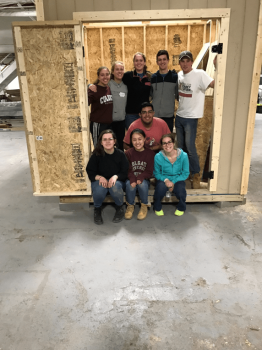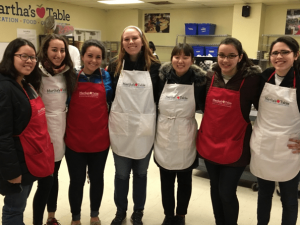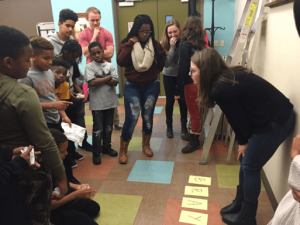
Habitat for Humanity alternative break volunteers.
The Max A. Shacknai COVE continues to offer opportunities to deepen student understanding of complex social issues by providing immersive experiences in environments very different from those available in the local community. Students participate in a series of preparation and reflective activities to create a rich learning opportunity. Alternative break trips are not discrete one-week experiences. In addition to committing to a work-intensive week, students are responsible for attending predeparture meetings that introduce the participants to the community and organization with which they will be working and the critical issues with which they will be dealing.
Students who participate are civically engaged and interested in effecting sustainable local and global change through a continued commitment. In total, 55 participants in these programs contributed more than 2,500 hours of direct service to these communities this year.
- Habitat for Humanity Spring Break Trip, Cleveland, Ohio
Volunteers worked on new construction of a home for a local family in Cleveland, Ohio. Participants also worked at the Cleveland ReStore, helping to organize and stock homebuilding supplies offered at a very low cost to the local community. Habitat for Humanity houses are simple, decent, and affordable for low-income families. Whenever possible, Habitat builds energy-efficient, sustainable housing. The goal of Habitat for Humanity is to help solve the global housing crisis and help the 48.5 million people living in poverty.
- Hunger and Homelessness Outreach Winter Break Trip, Washington, D.C.

Students volunteering at soup kitchen in Washington DC on Hunger and Homelessness alternative break trip.
America is one of the world’s wealthiest nations, especially when it comes to our agricultural production; yet enough food goes to waste each day to feed every hungry adult and child living in the nation. Each night some five million children go to bed hungry. As many as 3.5 million people each year have no bed to call their own, as they experience homelessness. Participants in this trip had the opportunity to explore the root causes of and efforts to improve the hunger and homelessness situation in America through a series of site visits, guest speakers, and discussions. Participants volunteered at soup kitchens and with various organizations that specialize in assisting and empowering the homeless population.Students participating in the trip attended an alumni reception with D.C.-based alumni working in the common good sector. The trip took place during the Presidential Inauguration, allowing students to be able to witness a national inauguration.One participant shared: “Going into the program, I knew that I had certain stereotypes of people suffering from homelessness and hunger and these speakers helped eradicate those stereotypes and left me with a very powerful message about ending homelessness… It was great to have such meaningful conversations with a diverse group of people that were previously strangers.
- Homeless and Gentrification Trip, Pittsburgh, Pa.

Students on Pittsburgh alternative break trip talking with local youths about their communities.
During the trip, participants were able to learn about gentrification and food security, and what those things mean to a city like Pittsburgh and its neighboring boroughs. By volunteering with Pittsburgh youth, engaging in local Martin Luther King Day celebrations, meeting with local political officials, and touring some of Pittsburgh’s historic neighborhoods, students gained a better understanding of the world around them and now view their fellow citizens with more open, understanding and empathetic eyes.Participants were hosted by Betsy Levine Brown ’01 and her parents, Susan and Tom Levine ’71, for dinner in their home to share the experiences of the week with alumni involved in the Pittsburgh Alumni Club.Laura Mucha ’20 said, “The past week learning about gentrification in Pittsburgh has been an incredible experience. Amizade’s programming gave me an authentic sense of the city’s neighborhoods as well as the local culture, and every organization we worked with was welcoming and well organized. We would typically do a service activity in the morning, interact with the community in the afternoon, and discuss the events of the day over dinner. Our conversations, facilitated by our Amizade group leader, truly rounded out the experience for me. Each person showed their unique light on the events of the day and widened my perspective on the issues at hand. I am so glad I participated in this trip and highly recommend the program to other students!”JJ Citron ’20 said, “This past week in Pittsburgh has been an eye-opening experience, as I have interacted with Pittsburghers of all ages. Amizade did an excellent job of not only bringing in speakers from various local organizations but also coordinating hands-on service. Two events specifically stuck out for me. Colgate students created a lesson plan in honor of MLK Day about Bayard Rustin and his activism. We visited the Youth Opportunities Development and worked with students in Clairton. We combined fun icebreakers and an informational activity; we shared laughs and learned more about each other. I felt so connected to these students. The second event that stood out was the Hill District Tour, led by Terri Baltimore. Ms. Baltimore did an excellent job of explaining the historical and modern aspects of life in the Hill District. It was a fantastic week, and I am so thankful for Amizade for exposing me to such a diverse range of people and organizations!
- Refugee Resettlement Trip, Clarkston, Ga.
Clarkston, Ga. is a small suburb town located just a few miles east of downtown Atlanta. Proclaimed as the “small town with a big heart,” Clarkston looked like any other small suburb in Georgia until the 1980s, when it was handpicked by refugee resettlement agencies as a location to welcome refugees coming to Georgia. Now, the town is thought to be perhaps the most diverse community in America. This trip focuses on issues surrounding refugee resettlement. Students volunteered with a number of organizations that help to integrate children of refugees into their new communities and schools.
- Leadership Program Development with Pathfinder Village in Edmeston, N.Y.
Pathfinder Village is a caring community offering independence to people living with Down syndrome and developmental disabilities. Volunteers participated in a five-day inclusive team-building program designed to build shared learning, mentoring, and coaching relationships between Pathfinder Village secondary students and college-age peers. Student volunteers are paired one on one with a resident for the duration of the week and each team works together on a variety of challenges. Activities include a ropes course, hike, cooking competitions, and planning a St. Patrick’s Day event for other residents. The goals of this trip are to build relationships with Pathfinder staff and residents while providing the organization with valuable service that will impact the lives of participants for years to come.
These deep immersion experiences are significant to students in terms of their ability to make meaning of what they learn in the classroom through direct application. Students have the opportunity to reflect on their personal values and ethics through the lens of often difficult experiences, leading to profound questions and conclusions.

